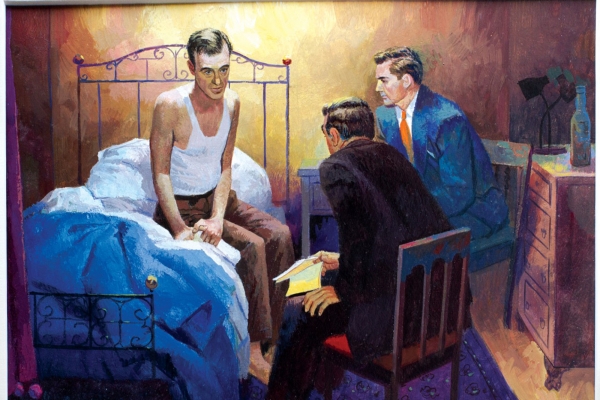Story Archive: Dinner with Doctors
In July 1975, when Alcoholics Anonymous celebrated its fortieth birthday in Denver, Colorado, AAs came together to celebrate sobriety and carry the message of their recovery to others.
By then, AA had taken root and flourished; that summer in Denver, twenty-nine countries were represented. And, although it had been forty years since a little doctor, affectionately known to alcoholics as "Silky," released Bill W. from a New York hospital for alcoholics, doctors and alcoholics still had much work to do -- work that would result in sobriety for many who had hitherto believed themselves hopeless and morally flawed.
In that convention center, a young, nonalcoholic man spoke about the gravity of cooperating with professional communities. A doctor himself, he spoke about the importance of medical professionals understanding alcoholism. He gave the assembled AAs the physician's experience with alcoholic patients, and told the crowd what most of them already knew -- that when a doctor sees an alcoholic patient in his office, "the patient is usually full of evasion, half-truths, rationalization, projection, lies, defensiveness, hostility, and arrogance."
The doctor reminded all present that "a medical doctor, Dr. Silkworth, provided the co-founder of AA, Bill W., with the concept that alcoholism was a fatal disease involving a mental obsession with alcohol coupled with a physical allergic reaction of the body.
"Offer the doctors your active help," he urged them. "Take them to an AA meeting. Let them see what it is all about. If you hold out your hand, they will take it."
Clearly, this was a physician who believed in the effectiveness of AA. However, in his 1975 address at AA's International Convention, he noted that alcoholism was not taught as part of the course curriculum in most medical schools: "Interns and residents still, for the most part, are not taught to treat alcoholism, and continue to care only for the patient's more severe symptoms or complications, even though fifty percent of the medical beds in most hospitals contain patients with this disease."
Not liking what he saw in medical communities about knowledge and treatment of alcoholism, the doctor took some action.
Nearly thirty years later, still a friend to AA, this physician, Dr. Nicholas Pace, is a founder of what New York AAs affectionately term "the Doctors' Program," a required course for first-year residents at a number of teaching hospitals in New York City.
The Doctors' Program is part of a larger program called the Physician Alcoholism and Addiction Training Program (PAAT) and is run under the auspices of the Alcoholism Council of New York. The goal of PAAT is to train primary care internal medicine physicians to diagnose, treat, and case-manage alcoholic and addicted patients. In the spirit and deed of cooperation, local and area CPC (Cooperation with the Professional Community) committees provide the program with willing members of AA to discuss their alcoholism and recovery, the Steps, the Big Book, what AA does, and what AA does not do.
Sober alcoholics act as "buddies" to primary care resident physicians and help the doctors understand the disease of alcoholism by talking about their experience and recovery. The relationship between the recovering alcoholic and the doctor is the key to the success of this program. The open dialogue and interview between the physician and the AA member helps the physician understand denial, the disease concept, the progressive nature of the disease, and relapse prevention.
Chances are good that, in the course of his or her work, a doctor will come across a patient with a drinking problem. Unfortunately, physicians often receive little or no training regarding diagnosis and treatment of alcoholism in the course of medical school and residency. The Doctors' Program and the members of Alcoholics Anonymous serving as "buddies" aims to change this fact and aid in carrying the message of recovery to the alcoholic.
During the program, the doctors are paired with their AA "buddies" for three evenings. The pair gets to know each other over dinner for three consecutive evenings. After dinner on the first day, the physicians and their buddies go to an AA meeting.
On day two, the doctors interview their buddies for a case study that they will write up by the week's end. One buddy said of this interview process, "I had to remember and explain, in detail, how much I drank, and how often. In my recovery, I don't often think of the exact amounts, or the precise frequency, that I drank. With the doctor's pressing interest in quantity, I really had to make an effort to recall, with some shock, how much I really drank."
On day three, after dinner, all AA members who participated in the Doctors' Program that month share in a round-robin discussion about how to stay sober. One question proposed to the buddies was, "Does it ever become easier to go out in social situations?"
There was general assenting, and one buddy, Max, said, "My experience is like in the Big Book -- I recoil from alcohol as if from a hot flame. But, if I do feel sensitive about alcohol, usually it's a spiritual disturbance."
Another woman smiled and responded, "Well, once you become a person who doesn't need a drink, you still can't drink. That's why I go to meetings and rely on the support of my AA group."
A driving force behind the Doctors' Program, Dr. Pace detailed its history, and why he finds it so effective. He said, "The time a doctor in this program -- a first-year medical doctor -- spends with his or her buddy is how much?"
He paused briefly to add up the hours. "Nine hours! When was the last time you spent nine hours with a doctor?"
I had to admit that I hadn't, ever, spent that much time with a doctor. At least not conscious time.
"And when was the last time a doctor ever spent nine hours with an alcoholic sober for a few years? An alcoholic who has sobered up, put his life together, and gone on to accomplish many things, some of them amazing?"
Suddenly, the scope and effectiveness of the Doctors' Program became obvious. After resident physicians complete the Doctors' Program, alcoholics are no longer just casualties in the emergency room or hopeless wretches bent on self-destruction. They have faces, names, useful, healthy, happy lives and a program of recovery in Alcoholics Anonymous.
"Physicians," he continued, "might spend nine hours or more with dying alcoholics; by their bedside, trying to keep them alive, but can you imagine the impact a sober AA member has on a physician? When they fully disclose all the lying, denial, and hiding that went into visits with a physician?"
Among the tens of thousands of patients a doctor will see over his career, many have trouble with drinking. Armed with the right tools, the proper knowledge, and the right amount of suspicion and skepticism when asking, "How much do you drink, and how often?" a physician may have the opportunity to steer an alcoholic in the direction of AA, a program most claim saved their life -- or gave it back.
On the final night of the Doctors' Program, the physicians are asked what they learned, and what they thought of the program. Dorothy D., of the CPC Committee of Southeast New York, reported "One doctor was asked for his thoughts. He was silent a moment, then he threw down his pencil, looked up at those gathered around the table, and said, 'My best friend is an alcoholic and I didn't know it until now.' The room fell silent. Many other doctors say things like, 'I treat alcoholics all the time and I never knew about Alcoholics Anonymous.' But once in a while," Dorothy conceded, "we do get doctors who don't want to be here or who think AA is cult-like. We answer them to the best of our ability and continue our work. We may not be able to reach everyone, but if some come away from this program with a better idea of what Alcoholics Anonymous can do for a suffering alcoholic, then we have made a difference; we have helped carry the message to an alcoholic who might not otherwise hear it."
From the Story Archive: May 2006





